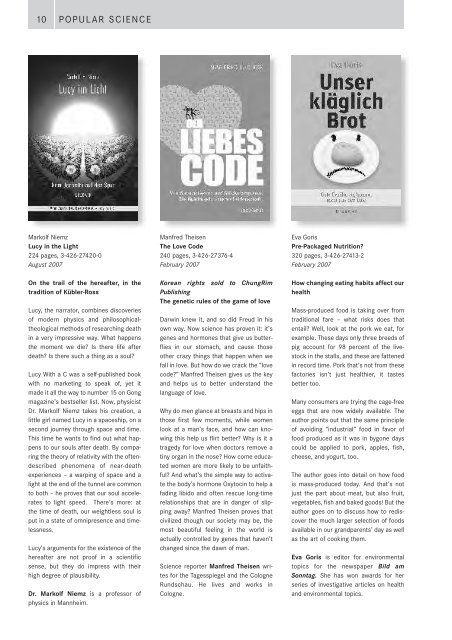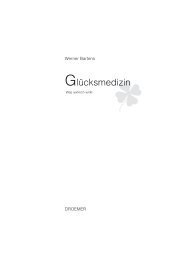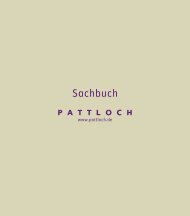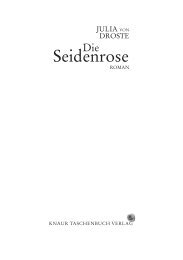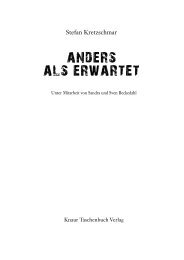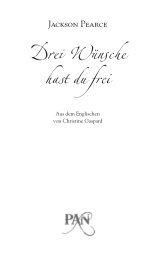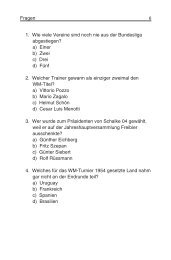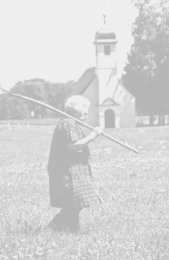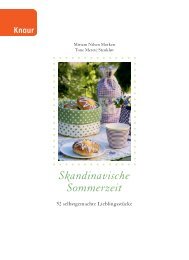Create successful ePaper yourself
Turn your PDF publications into a flip-book with our unique Google optimized e-Paper software.
10<br />
POPULAR SCIENCE<br />
Markolf Niemz<br />
Lucy in the Light<br />
224 pages, 3-426-27420-0<br />
August 2007<br />
On the trail of the hereafter, in the<br />
tradition of Kübler-Ross<br />
Lucy, the narrator, combines discoveries<br />
of modern physics and philosophicaltheological<br />
methods of researching death<br />
in a very impressive way. What happens<br />
the moment we die? Is there life after<br />
death? Is there such a thing as a soul?<br />
Lucy With a C was a self-published book<br />
with no marketing to speak of, yet it<br />
made it all the way to number 15 on Gong<br />
magazine’s bestseller list. Now, physicist<br />
Dr. Markolf Niemz takes his creation, a<br />
little girl named Lucy in a spaceship, on a<br />
second journey through space and time.<br />
This time he wants to find out what happens<br />
to our souls after death. By comparing<br />
the theory of relativity with the oftendescribed<br />
phenomena of near-death<br />
experiences – a warping of space and a<br />
light at the end of the tunnel are common<br />
to both – he proves that our soul accelerates<br />
to light speed. There’s more: at<br />
the time of death, our weightless soul is<br />
put in a state of omnipresence and timelessness.<br />
Lucy’s arguments for the existence of the<br />
hereafter are not proof in a scientific<br />
sense, but they do impress with their<br />
high degree of plausibility.<br />
Dr. Markolf Niemz is a professor of<br />
physics in Mannheim.<br />
Manfred Theisen<br />
The Love Code<br />
240 pages, 3-426-27376-4<br />
February 2007<br />
Korean rights sold to ChungRim<br />
Publishing<br />
The genetic rules of the game of love<br />
Darwin knew it, and so did Freud in his<br />
own way. Now science has proven it: it’s<br />
genes and hormones that give us butterflies<br />
in our stomach, and cause those<br />
other crazy things that happen when we<br />
fall in love. But how do we crack the “love<br />
code?” Manfred Theisen gives us the key<br />
and helps us to better understand the<br />
language of love.<br />
Why do men glance at breasts and hips in<br />
those first few moments, while women<br />
look at a man’s face, and how can knowing<br />
this help us flirt better? Why is it a<br />
tragedy for love when doctors remove a<br />
tiny organ in the nose? How come educated<br />
women are more likely to be unfaithful?<br />
And what’s the simple way to activate<br />
the body’s hormone Oxytocin to help a<br />
fading libido and often rescue long-time<br />
relationships that are in danger of slipping<br />
away? Manfred Theisen proves that<br />
civilized though our society may be, the<br />
most beautiful feeling in the world is<br />
actually controlled by genes that haven’t<br />
changed since the dawn of man.<br />
Science reporter Manfred Theisen writes<br />
for the Tagesspiegel and the Cologne<br />
Rundschau. He lives and works in<br />
Cologne.<br />
Eva Goris<br />
Pre-Packaged Nutrition?<br />
320 pages, 3-426-27413-2<br />
February 2007<br />
How changing eating habits affect our<br />
health<br />
Mass-produced food is taking over from<br />
traditional fare – what risks does that<br />
entail? Well, look at the pork we eat, for<br />
example. These days only three breeds of<br />
pig account for 98 percent of the livestock<br />
in the stalls, and these are fattened<br />
in record time. Pork that’s not from these<br />
factories isn’t just healthier, it tastes<br />
better too.<br />
Many consumers are trying the cage-free<br />
eggs that are now widely available. The<br />
author points out that the same principle<br />
of avoiding “industrial” food in favor of<br />
food produced as it was in bygone days<br />
could be applied to pork, apples, fish,<br />
cheese, and yogurt, too.<br />
The author goes into detail on how food<br />
is mass-produced today. And that’s not<br />
just the part about meat, but also fruit,<br />
vegetables, fish and baked goods! But the<br />
author goes on to discuss how to rediscover<br />
the much larger selection of foods<br />
available in our grandparents’ day as well<br />
as the art of cooking them.<br />
Eva Goris is editor for environmental<br />
topics for the newspaper Bild am<br />
Sonntag. She has won awards for her<br />
series of investigative articles on health<br />
and environmental topics.


